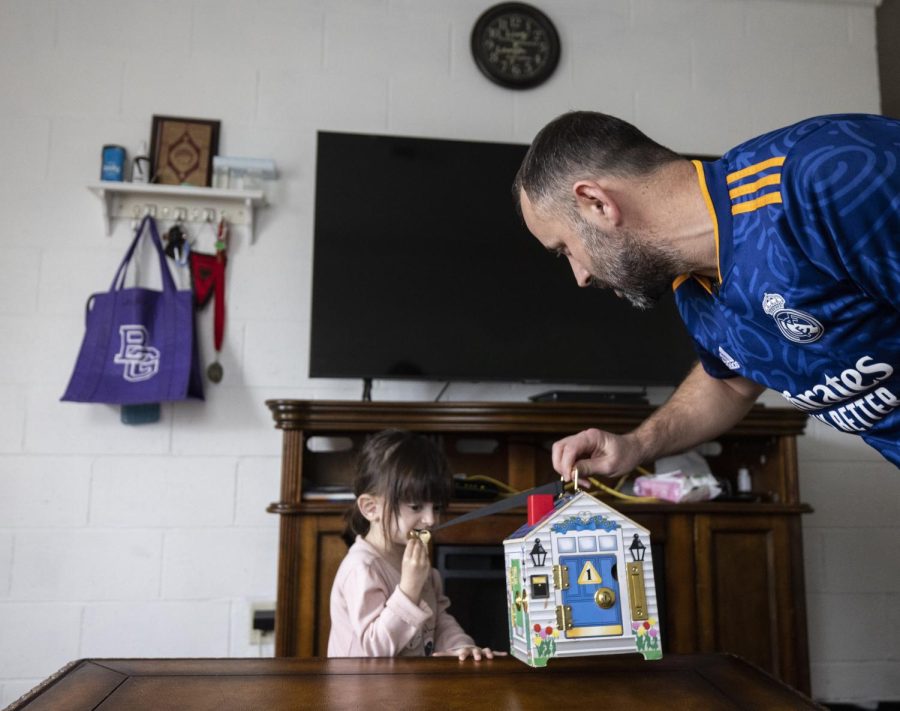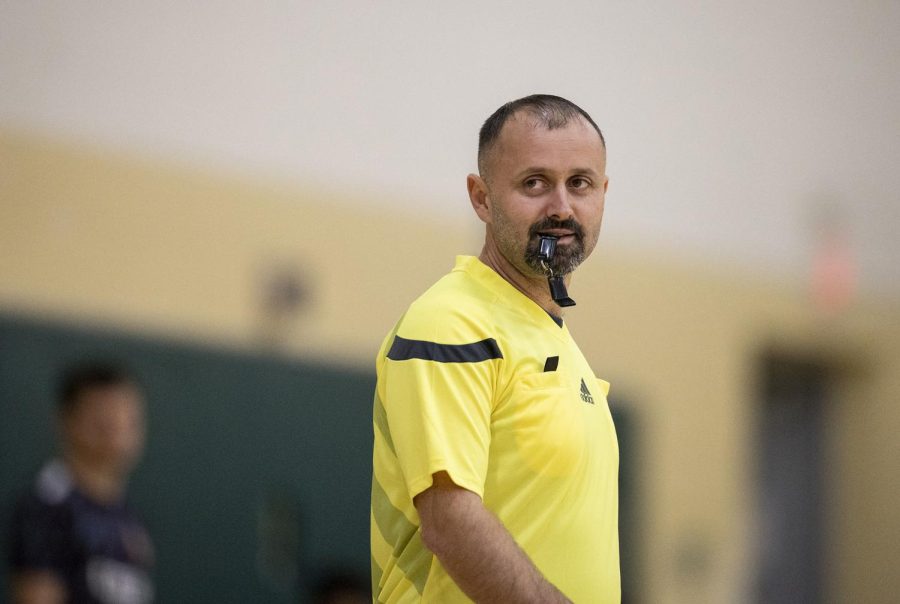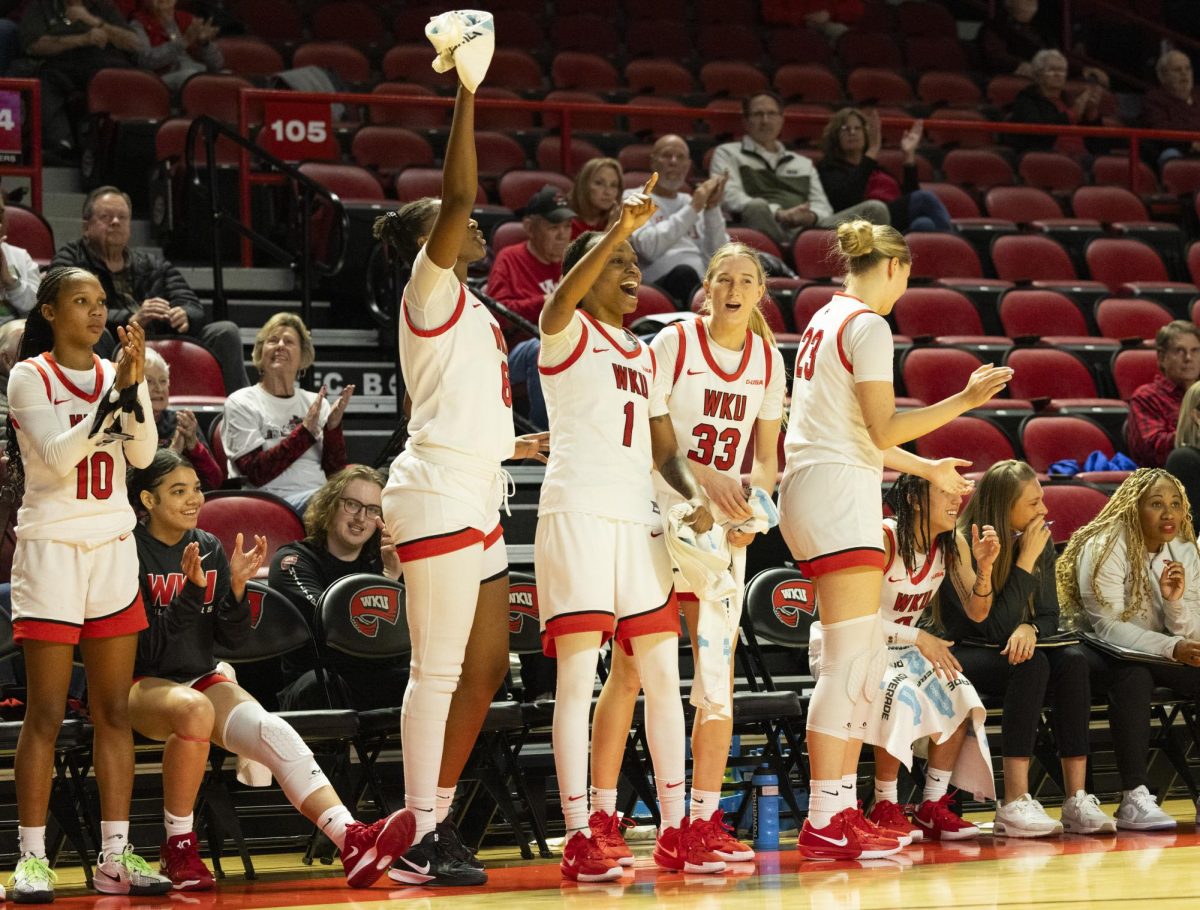Refugee, referee, custodian, father: The busy life of a Bowling Green Kosovar
Jeton Hyseni refs and manages an international soccer league at the Kummer Little Recreation Center in Bowling Green.
May 16, 2023
Sharp squeaks on the hardwood cut the air inside of the F.O. Moxley Community Center gymnasium. But the familiar noise is not from a game of basketball.
Instead, two amateur soccer teams – Bosnia and Lyons F.C. – are locked in a spirited match under the industrial glow of the gym lights. Shouts in Spanish and Bosnian rattle the bleachers as a Lyons player, decked out in a grey Arsenal jersey, gets free on the sideline and sets up for a shot.
At the last second, one of Bosnia’s defenders intervenes and blocks the attempt with his shin, sending the ball careening off course. An exasperated shout of “mierda!” is sent up to the rafters.
The referee overseeing the match is approached by the Lyons forward, perhaps hoping for a favorable call.
With his whistle clenched tightly in the side of his mouth, the ref doesn’t budge.
“He blocked you,” the ref says, not interested in any argument. “You shot it. He blocked you. That’s why I didn’t call it.”
This referee is Jeton Hyseni, the man responsible for the action in the gym this afternoon. He has managed and officiated this international soccer league since 2011, earning the respect of all who compete. He says anywhere from 7 to 8 languages are spoken by the players.
Play resumed, Jeton returns to prowl the sidelines. It’s hard to miss him in his neon yellow Adidas jersey, scorecard and pen by his side. The match, scoreless in the first half, quickly turns into a rout. Lyons takes advantage of Bosnia’s weak net and scores a lopsided 8-1 victory.
Jeton mingles with the players after the match. He says this was the first of five games he’ll referee today, and 10 games total will take place under his watch before the weekend is out.
It’s easy to see why Jeton has such a strong work ethic. For starters, he was forced to grow up quickly due to the Kosovo War.
Throughout the 1990’s, tensions bubbled between ethnic Albanians and ethnic Serbs in the Serbian province of Kosovo.
The Kosovo Liberation Army was formed in 1996 and carried out sporadic attacks on Serbian political figures for two years before Serbian police and Yugoslav forces made an attempt to re-establish control over the region.
The use of force made swaths of refugees flee Kosovo. The conflict caught the eye of the international community, and after diplomatic negotiations broke down in 1999, NATO forces began air striking Serbian targets. In response, Serbia and Yugoslav forces drove out and displaced Kosovo’s Albanian population.
Jeton was at the ground floor of the conflict. A Kosovar, he spent the summer of 1999 in a North Macedonian refugee camp, which is where the sixteen-year old got his first job: distributing food to others fleeing the terror.
“That was my first job and I haven’t stopped working yet,” he says.
The Hysenis, five in all, did not know where they were going to end up when given the chance to move to the States. The International Center of Kentucky resettled the family, provided them the necessary documents and picked them up from the Nashville airport that July.
He recalls being surprised on the drive up from Music City – he thought Bowling Green would have more tall buildings and didn’t expect to see the little rural towns that dot the landscape.
Because he was the oldest child, Jeton’s father, Aziz, gave him a mission when the family started adjusting to their new life. He was to care for his brother, Driton, and sister, Jehona.
“These are your kids now, not mine,” he remembers Aziz telling him. He made good on his responsibility to lead the family, getting a driver’s license in a matter of months and graduating from Bowling Green High School in four years.
“That’s my little town where I grew up,” Jeton says, sharing photos of Uglari, Kosovo, a little village tucked into the Balkan foothills. Small townhouses with red roofs dot the sloping greenery.
He recalls, long before the war, playing soccer on the river that cuts through town.
“When it gets cold it gets frozen, you could even drive a car on top of it,” he says.
Jeton flies home to visit when he can, his most recent trip coming in 2017. He has been wanting to go back since 2019, but the COVID-19 pandemic and Aziz’s declining health put a wrench in the travel itinerary.
“I hope I get to go visit this summer because six years is a very long time,” he says.
While homesickness might persist, Jeton has no plans to move away from Bowling Green. He’s become too entwined with its people.
When he isn’t refereeing the international league, Jeton works as a custodian at the Warren County Area Technical College.
The building’s cleaning supplies storage area doubles as his office, the place where Jeton plans out the league’s schedule and calculates the current standings when he isn’t needed elsewhere.
“I watched all the World Cup in here,” he says, pointing to the computer monitor sitting on his personal desk. His soccer fandom revolves around Real Madrid and star forward Cristiano Ronaldo.
Jeton played as a forward, too, in his youth.
“I was a goal-scoring machine,” he says, reminiscing on his athletic feats.
The concrete room, filled with the low hum of the building’s HVAC system, affords Jeton peace and quiet. He has a little bit of those precious commodities right now – at least until August, he says.
“In August, I start the high school season, and that’s even more drama than my adult league,” he says.
Running the international league, as demanding as it can be, still has yet to burn Jeton out. The steady carousel of new players and coaches keeps things interesting year after year.
“You’re not dealing with the same people over and over,” he says. “But even if you are dealing with the same people over and over it’s kind of good because you get the hang of how they want stuff to be done, how you communicate with them.”
He compares it to a machine – “if you work one machine for 20 years, it might get boring after some years.”
Most of his work at the ATC is done in the summertime, stripping and waxing the classroom floors when the kids are away. He had no idea how the process was done when he arrived, but “now I can do it in maybe 10 days.”
That said, he doesn’t want to work too quickly, because then there will be nothing left to do.
“If I get it done all in one week, what am I going to do for five weeks or six?”
When he arrived at the ATC almost four years ago, Jeton didn’t think he’d stay for very long. He’s glad he stuck around.
“I never felt any job that considered me a part of the family,” he says. “We here have a group text and any thing that happens to somebody or their family, they’re so good at helping someone out. This place makes me feel like I’m part of the family.”
When Aziz passed away last February, his ATC coworkers gave him a card and time off. Some of the carpentry students worked to create a memorial plaque as a gift.
“Just saying you are sorry, that means a lot,” he says.
Jeton’s household is full of life and sound.
A Premier League match between Manchester City and Crystal Palace fills the television, the Sky Blues winning 1-0. Jeton’s son Landrit watches YouTube videos on his blue plastic kids tablet, the sound from the speakers echoing off the home’s white cinder block walls.
A small pennant of Albania’s flag, one of Jeton’s spoken languages, hangs on the key rack just inside the door. Just above sits an ornate copy of the Quran. The floors are covered in intricate rugs that have seen decades of use.
“This is Liona, she’s three years old – this is Landrit, he’s five years old,” the proud father says.
Jeton and his wife, Blerina, sit on the couch in matching Real Madrid kits with little Liona between them, who rocks back and forth.
“That’s pretty much what they do, stay on the laptop or iPads,” Jeton says with a hint of playful exasperation.
The couple first met in 2013 through Facebook, with Jeton flying back to Kosovo to visit.
They were engaged a few years later and Blerina arrived in the U.S. on a fiancé visa in 2015, which gave them three months to wed.
The couple are both Muslim, but Jeton says he hasn’t been able to actively live out his faith as much as he would like due to his schedule. He is proud of the
fact that he’s only missed two Rama- dans since moving to the U.S., going so far as to referee a full slate of games with no water one year.
“He just shed a couple of pounds,” Blerina says.
Jeton is usually able to relax a bit on the weekends, but not this time. He is tired. His mother, Magule, is not doing well.
“My mom is in hospital, she’s been in hospital since Thursday night,” he says. “I spent freakin’ nine hours just to get her in the ER, and by the time they took her to her room I went home. I had to get up in the morning to go to work.”
Her father’s stress doesn’t bother Liona, who is all giggles. Jeton finally cracks a smile and blows a raspberry on her stomach, eliciting a joyful shriek.

“She’s happy right now, but she might change,” Blerina says, smiling at her daughter.
Landrit is now in the kitchen with his tablet, but the volume is still high enough to compete with the television.
“He never likes to play the normal sound, he will speed it up,” Jeton says. Blerina takes a look over her shoulder back at her son. “Most of the time it will be slow motion and it drives people crazy.”
The family has called the house, nestled north of downtown Bowling Green, home for about 12 years now.
“I’m in the process of trying to buy a (new) house, but my income isn’t all that great,” Jeton says.
Blerina says the cinder block walls remind her of how homes are constructed back in Kosovo. Drywall structures seem flimsy in comparison.
“I thought at least all houses were similar, when I went to work the material was like paper or something,” she says. “Oh my god, are you trying to make a shed?”
The two weren’t used to violent storms, especially ones that could shred houses apart. The strongest storms they’d seen in Kosovo would just yank off a few terracotta tiles.
It’s no wonder Bowling Green’s tornadoes of December 2021 left a mark on Blerina.
“From that night, every time I hear the alarm, I swear to god it’s like a shadow. It’s scary,” Blerina says. “In our country, we don’t have tornadoes. The wind is scary enough.”
Jeton admits that he slept through the whole thing. Blerina still can’t believe it.
“When we buy a house the first thing I’m going to build is a shelter, I swear,” she says.
Liona has disappeared around the corner to the kitchen, but returns clutching a bag of gummy bears to show to her mother. Blerina says both kids likely have non-verbal autism, so she has gotten good at reading what they need.
“Since I am here all the time I can understand almost everything that they want. They are pretty independent, you know? What they want to eat, they’re going to show you,” she says. “There is no problem in daily life except in conversation, of course we want to hear them talking to us.”
She says both kids started speaking when they were eight months old, words like “mom” and “dad.” All of a sudden, right around 13 months, they stopped.
“Landrit talks, but not what you ask him, more like gibberish or whatever he listens to on his tablet,” Jeton says. “He doesn’t follow directions as much, but he’s getting better (than) where he was.”
To the dismay of the parents, neither of the children have shown any interest in soccer thus far. The pair want their kids to know all there is to know about their ethnic culture – including soccer – but right now, Jeton says there are more important things to work on.
“Right now I just want them to be able to talk,” he says.
The kids are working with speech and occupational therapists and are both in preschool at Parker-Bennett-Curry Elementary.
“That’s been very helpful,” Jeton says.
He hopes that one day he can see both his kids enroll at WKU. Blerina says the kids both love school, so much so that there are days when Liona doesn’t want to come home.
“She’s like him,” Blerina says, gesturing to her husband. “The same temper, the same everything.”
Jeton just smiles. He may be busy, but he’s giving his kids something he didn’t have – the chance to grow up at their own pace.
“That’s why I stay busy pretty much all year long, to make up a living,” he says. “I hope I can provide for them until they’re older than 16 like my dad did.”
Jake Moore can be reached at [email protected]. Follow him on Twitter @Charles_ JMoore.














